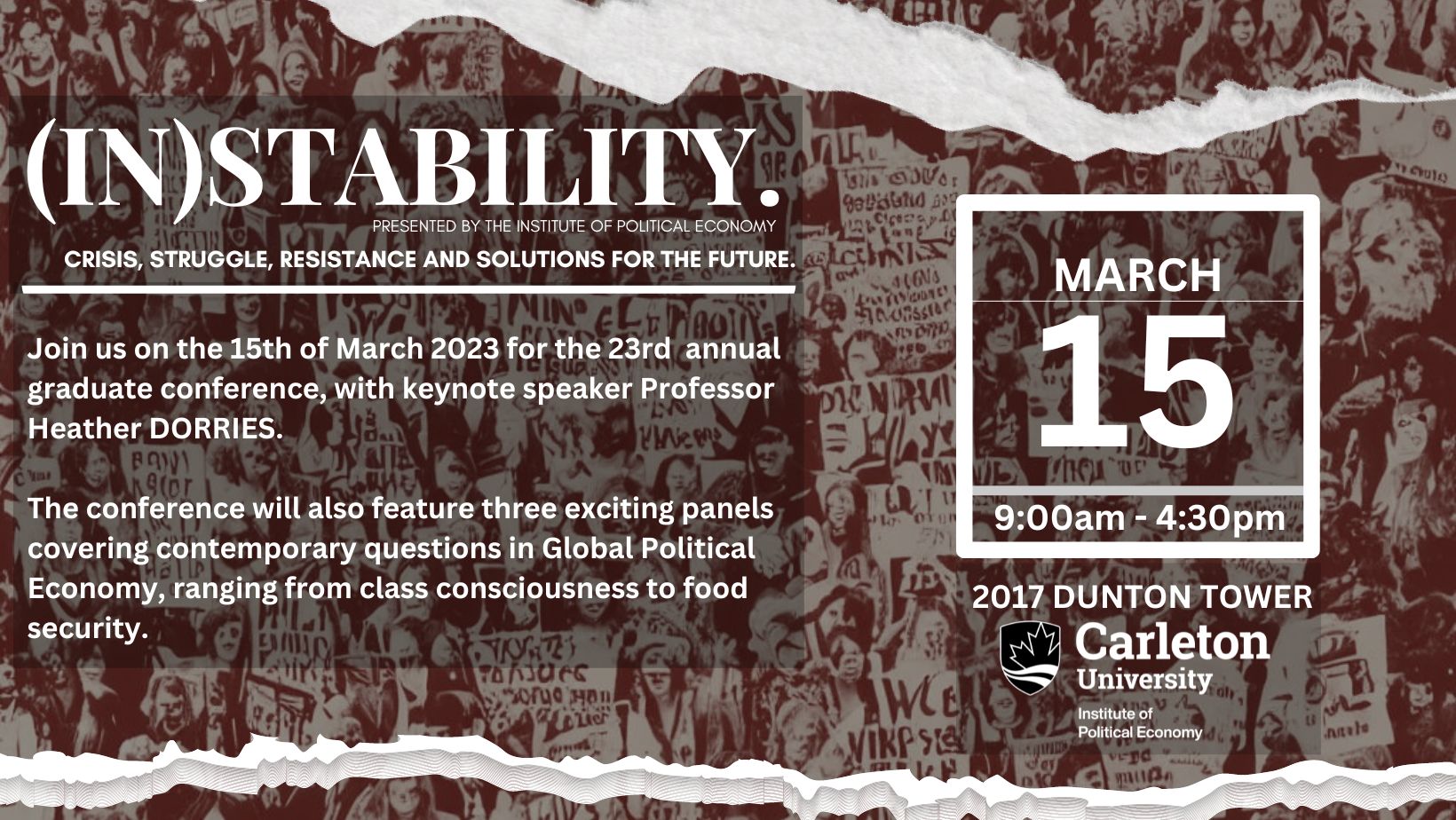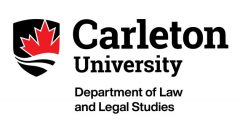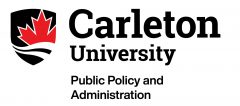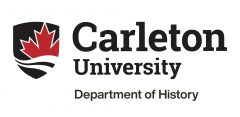Notice:
This event occurs in the past.
Institute of Political Economy Annual Graduate Student Conference: (IN)STABILITY.
Wednesday, March 15, 2023 from 9:00 am to 5:00 pm
- In-person event
- 2017, Dunton Tower, Carleton University
- 1125 Colonel By Drive, Ottawa, ON, K1S 5B6
- Contact
- IPEgradconf@gmail.com

The Institute of Political Economy will be hosting an in person event for this year’s annual graduate student conference. . This event is open to the public, but registration is required [complete form below].
Entrenched within the struggles for social change, this year’s conference aims to expand upon the concepts of Stability and Instability beyond casual definitions. Ultimately, we hope to realise (In)stability as it relates to resistance experientially and theoretically. In this context, Stability is framed as a condition for the potential of constant resistance to form actionable pressures and radical challenges. Instability can be understood as the capacity to disrupt and negate the reproduction of capitalism’s conditional crises and their effects. Paradoxically, the instability produced by the capitalist drive for endless growth on a finite planet is also an obstacle to revolutionary struggles, as life’s sustainability and possibilities are increasingly uncertain.
As such, we tentatively understand stability as being sought through various instabilities; stability as the connective tissue strung across the spatial and historical remnants of resistance, past and future, that supports the potential for revolutionary action now.

Keynote Speaker: Heather Dorries, University of Toronto
Professor Heather Dorries is of Anishinaabe and settler ancestry and a member of Sagkeeng First Nation in Treaty 1. She is an Assistant Professor jointly appointed to the Department of Geography and Planning and Centre for Indigenous Studies at the University of Toronto. Her research focuses on the relationship between urban planning and settler colonialism and examines how Indigenous intellectual traditions—including Indigenous environmental knowledge, legal orders, and cultural production—can serve as the foundation for justice-oriented approaches to planning.
Professor Dorries will be speaking on the theme of resistance and the ways it has been criminalized, specifically in instances of Indigenous resistance. Playing into the conference title of (In)stability, Professor Dorries will further incorporate Indigenous legal orders in her discussion and build off Leanne Simpson and others to include other academics’ perspectives into this broader conversation of resistance. She will also touch upon how life itself is a practice of resistance and how our everyday lives question the systems in which we inhabit. Finally, she will end by speaking on the creation of possibilities that we can embrace into our lives, whether ideologically or in practice.
Conference Schedule:
Wednesday, March 15, 2023
Conference Opening with Elder Irene Compton
9:45am – 11:00am – Panel 1: Unions
Moderator: Dr. Zbyszewska, Department of Law and Legal Studies
Panelists:
Ariel Becherer
Social Reproduction Theory, Energy Sovereignty and Climate Change as Class Warfare – Strategic Considerations for Life-Making in the Global North: Will be exploratory, and discussion the challenges in aligning strategic lessons from Bhattarcharya’s social reproduction theory, Bhattacharyya’s work on Racial capitalism, Huber’s work on climate change as class warfare, and Mitchell’s work on carbon democracy. I will outline their theories (among others) and their implications for activism/life making as we face ecological collapse.
Ariel Becherer was born and raised a settler on colonized K’omox lands. She is a master’s student in political economy at Carleton, and has just been accepted into a phd in sociology at Carleton, for a project on the relationship between energy workers and democracy in so-called “British Columbia, Canada.”
Jacob Wilson
Consciousness, Class Struggle, and the Capitalist State: Forms of Class Struggle and their Prospects – How do different practices produce openings for change? Class consciousness is shaped by the practice of class struggle, and class consciousness shapes class struggle. Comparing Canadian juridified class struggle and confederal unionist projects in mid-20th century Uruguay reveals differing consciousnesses and practices. We conclude by critiquing the increasingly popular McAlevey organising method, examining the consciousness it produces.
Jacob Wilson is a first-year MA candidate at the Institute of Political Economy at Carleton, and a trade union organiser in his home city of Halifax, NS. After receiving his BA from York University in 2017, he worked in construction and with the PSAC. He is an engaged community organiser, activist, and general rabble rouser, with an interest in housing justice and the labour movement, among other causes. His area of research interest is the intersection of financialized housing markets and pension fund investment.
Zoë Abernethy
Institutionalized Unionism and its Contradictions: A Case Study of the UFCW-Uber Agreement – This presentation will discuss the recent closed-door deal struck between the United Food and Commercial Workers (UFCW) and Uber Canada as a case study for examining the contradictions inherent to institutionalized unionism, and the limitations of traditional union tactics in the face of innovative modes of exploitation.
Zoë is a 2nd year Political Economy MA student in the Work and Labour Concentration. She is currently writing her thesis, tentatively titled Neoliberal Policies and Rhetoric in the Struggle for Ontario Gig Workers’ Rights. In addition to her research on gig work and the contemporary Canadian labour climate, Zoë was elected from the rank-and file as CUPE 4600 Vice-President Unit 1, the bargaining unit comprised of teaching assistants, internally-funded research assistants and service assistants at Carleton. She also sits on the negotiating committee for the current round of bargaining.
Leila-Ann Fife
The Attention Economy: Exploitation and Solidarity in a Post Covid Imaginary – Exploring one of Capitals latest avenues for accumulation, human attention, my presentation will analyse Marxist oriented conceptualizations of attention as a “free” act of labour. Furthermore, I will discuss both civil and political strategies to mobalize solidarity against “‘Big Data” and it’s exploitative nature.
Leila-Ann Fife is a first year Masters student at the Institute of Political Economy where she is pursuing research in areas of work and labour theory, feminism and Marxism more broadly. Leila-Ann graduated with a Bachelors degree in Political Science and History from the University of New Brunswick in spring of 2020. As such, their research interests have been heavily influenced by the proliferation of digitization precipitated by the Covid-19 global pandemic.
11:00am – 11:15am Break
11:15am – 12:30pm – Panel 2: Class
Moderator: Dr. Douglas, Department of Law and Legal Studies
Panelists:
Tim Hayslip
Theorizing can Transform Authenticity into Unlivability – Lynn Nottage’s 2017 Pulitzer Prize-winning play Sweat depicts the tragedies stemming from American deindustrialization. Karl Marx’s argued such instances of class warfare were necessarily recurrent features of capitalism. My presentation utilizes narrative analysis and economic data to contrast the receptions of Nottage’s play, which is often seen as authentic, with Marx’s perhaps ‘unliveable’ economics.
Tim Hayslip is a second year PhD student in York University’s Sociology Program. His MA thesis, titled Dialectical Naturalism: Studies in Marxist Social Ontology, situated Soviet dissident philosopher Evald Ilyenkov’s contributions within the classical sociological canon. His current research focuses on the intersection of the sociology of knowledge and economic sociology. More specifically, his upcoming dissertation seeks to explain the popularity of the Austrian School of Economics and its apologia for class warfare from above.
Neve Sugars-Keen
Climate Counter-revolution: Albertan extraction, accumulation, and the Convoy movements – The perceived economic benefits provided by the fossil fuel industry and supported by right-wing neoliberal political ideologies of free markets and low tax rates provide the basis for a specific form of neoliberal populist protest exemplified by the United We Roll and Freedom Convoys. Herbert Marcuse’s work on counter-revolution can give valuable insights into these.
Neve Sugars-Keen is a first year Master’s student in Political Economy at Carleton University. She has a combined B.A. in Humanities and Biology, and enjoys using this variety of perspectives to examine climate change and resource extraction in Canada today. Her research centers around extractive populism and the fossil fuel industry in Canada, with an interest in how we can move forward towards a green future both equitably and sustainably—and the societal and environmental dangers of failing to do so.
Matty Peters
Consistent Instabilities and Inconsistent Stabilities: Paradox or Building Blocks? – In my presentation I intend to briefly follow the relationship between the stable, unstable, consistent, and inconsistent, from the inorganic to the cultural. In doing so, I will outline the relationship of inconsistency with stability, consistency with instability, and use that framework to present an analysis of the #defundthepolice movement.
My name is Matty Peters (they/them), and am an interdisciplinary scholar pulling from fields such as psycho-analysis, post-structuralism, existentialism, Marxism, and cultural studies. I am currently organizing my comprehensive exam readings, which will be based on Assemblage Theory and Existentialist Ethics. My work is currently moving in the direction of discussion violence as a constitutive process. Authors I am currently reading and engaging with include George Bataille, Frantz Fanon, Alain Badiou, Manuel DeLanda, Michel Foucault, and Jean-Paul Sartre.
Alex Purdye
The Political Aspects of a Green New Deal – In recent years, the Green New Deal has emerged as a political project that attempts to resolve ecological and class contradictions. However, the dominant American articulation of the Green New Deal reconstructs the same issues that post-war social democracy faced. This raises crucial limits regarding the durability of the Green New Deal as a political programme.
Alex Purdye is an MA student at the Institute of Political Economy based out of Carleton University. He received an undergraduate degree in International Development Studies from Trent University where he developed a keen interest in the structure of capitalism as a global system. His current work is focused on a critique of Chartalist theories of money and the prospects of American social democratization.
12:30pm – 1:30pm Lunch – provided, must register
1:30pm – 2:45pm – Panel 3: Nature
Moderator: Dr. Auld, School of Public Policy and Administration
Panelists:
Rebecca Johnson
A Political Bee-conomy – By attempting to take bees seriously as labourers, this paper explores the human-nature divide as a constructed hierarchy upon which capitalism lies. Structurally similar to other human hierarchies, the human-nature divide provides capital with avenues for accumulation and expandable bodies.
Rebecca Johnson is a student doing their MA in political economy with a specialization in climate change. Rebecca completed her Honours Double Major in Anthropology and Psychology at Nipissing University, with a research focus on the political ecology of dreaming and intersections between sleep inequity, neoliberalism, colonialism, and other axes of oppression. Rebecca’s current research seeks to examine historical and contemporary iterations of the intentional sustainable communities movement in Ontario.
Julia Sterling
The Climate Virus: Gleaning lessons from COVID-19 towards urgent climate action in Canada – A cross-crises comparison between COVID-19 mobilization efforts and the slow-moving climate action response in Canada that explores critical lessons learned from diverse civil society perspectives. Although this work is ongoing, some preliminary findings will be shared. Let’s discuss how this comparison resonates with you!
Julia Sterling achieved a Bachelors of Global and International Studies with a specialization in Globalization and the Environment in 2021 from Carleton University. She is currently enrolled in her Master’s of Arts in Political Economy at Carleton University. Her thesis compares the rapid COVID-19 mobilization efforts to the delayed climate action response in Canada to analyze civil society perspectives about critical lessons learned and potential pathways forward. Julia is passionate about climate justice and mobilizing climate knowledge beyond academia.
Rachel Woods
Who feeds the future? Ethiopian women – Women are key in Ethiopia’s agricultural labour force yet are overlooked in discourses of food security. Analyzing Feed the Future’s discourse of food security through a feminist social reproduction lens displays connections between the empowerment of women and their explicit inclusion in the discourse.
Hi, my name is Rachel Woods! I am a first year Political Economy masters candidate specializing in climate change. This past Spring, I completed my undergraduate degree in Global and International Studies with a specialization in global development at Carleton University. My general research interests are food systems, the political ecology of food systems (and the labourers associated), the empowerment of women, international agricultural assistance programs, as well as climate change considerations in relation to subsistence farming.
Christian Chin
From Rubber to Batteries – the pathology of technological Modernity – By analyzing the innovation patterns of Lithium-Ion batteries, and its relationships to the global value chains of BEVS, strategic linkages within the global value chain can be found and applied to policy reforms and sustainable development initiatives that benefit the regional economies and local communities of the Democratic Republic of the Congo.
My name’s Christian and at my current day job I build authentic Mongolian Yurts. I graduated with a dual degree from Carleton in Global and International Studies, specializing in Global Media and Communications. I’m currently studying online at the University of Sussex for an MSc in Sustainable Development. I like to ride bikes, climb stuff, and have discourses about alternative ways of being.
2:45pm – 3:00pm Break
3:00pm – 4:15pm Keynote
Speaker: Heather Dorries
Moderator: Dr. Hugill
Conference Closing with Elder Irene Compton
Conference Sponsors:
 | 
| |
 |  |  |
 |  |  |
 |  | |